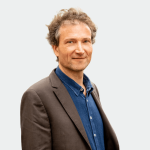[FR] This Europe that protects itself from Macron

In the amphitheatre of the Sorbonne, Emmanuel Macron had given a visionary speech for Europe. Seven months later, in the Strasbourg chamber, the orator entered the arena. He experienced the harsh reality of the immobility of political positions, which he had been so successful in shifting in France during his presidential campaign. If he received a standing ovation from a large part of the European Parliament, it was primarily to thank him for his performance at the end of three hours of uncompromising debate.
When addressing the European Parliament, Emmanuel Macron knew he was facing an assembly where no one belonged to his political family, as he pointed out at the end of the debate. And where, apart from the elected representatives of the ALDE group (centre-liberals) led by Guy Verhodfstadt and a few from the EPP (European People’s Party, right-wing) and social democrats, no one seems in a hurry to follow him. The leader of the Greens, Philippe Lamberts, was particularly harsh in his criticism, even though his group is traditionally one of the most pro-European. The French President met mainly with the EPP group, the most powerful in the legislature, which is seeking to avoid being swept up in his momentum and to slow him down.
Emmanuel Macron attacked what he sees as a Europe that is cautious, stuck in the status quo, and characterised by a sluggishness and prudence that he considers deadly. He summed it up as a ‘Europe of sleepwalkers’. But they do not want to follow him blindly. They fear a French-style Europe, making any support conditional and weighing up every move. In short, while the head of state has once again set out his priorities for a ‘Europe that protects’, the Europe in power wants to protect itself from him.
The vote against his transnational list project at the beginning of the year was already the first clear sign of this. The latest came directly from the Bundestag, where the CDU-CSU showed its hostility to any serious progress on economic and monetary union. Whether in the European Parliament or in Berlin, Germany is not responding to the overtures Emmanuel Macron has been making since he came to power. He wanted to govern ‘with’ her, but she is turning her back on him. A meeting with the Chancellor will not be enough to breathe new life into Franco-German relations, which remain elusive after six months of patience in Paris while a coalition takes shape in Berlin. Many MEPs have expressed their fears to the French President about a Franco-German partnership that is considered too exclusive, but at this stage, the partnership remains purely symbolic. The engine is idling.
Emmanuel Macron is seeking to break out of this unfavourable political context. On the one hand, speaking after the Hungarian elections, he has positioned himself as a defender of liberal democracy, which is not limited to the unquestionable rule of the majority but is defined as inseparable from respect for the rule of law. By positioning himself as the anti-Orban of Europe, he is touching on the fundamentals of European integration. And he is pressing where it hurts the EPP and where it could split if the Hungarian Prime Minister steps up his provocations.
On the other hand, the French President is setting out his priorities. He did not bring up everything from his long list of European proposals outlined in his speech at the Sorbonne on 26 September in Strasbourg. The reform of the Economic and Monetary Union is cautiously spread over several years, with yet another “roadmap” to be agreed with Angela Merkel by June. On the other hand, the taxation of GAFA companies, the reform of asylum law and the protection of the Union’s external borders have been clearly identified as achievements to be realised between now and the European elections.
Finally, in the absence of support from the Council and the European Parliament, Emmanuel Macron is seeking it through ‘citizen consultations’, which he launched in France on 17 April in Épinal in the Vosges. This exercise in participatory democracy, unprecedented at European level, could serve to raise issues that have so far been rejected by his peers. By debating for nearly three hours in Strasbourg, the French President showed his respect for the European Parliament. But by continuing the debate in a more popular format in Épinal, he sent the message that his rebuilding of Europe was not being played out with an outgoing assembly but was being prepared by seeking new forces.




